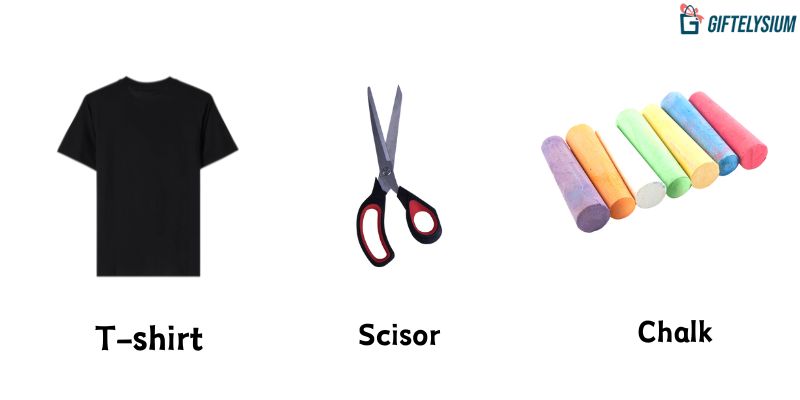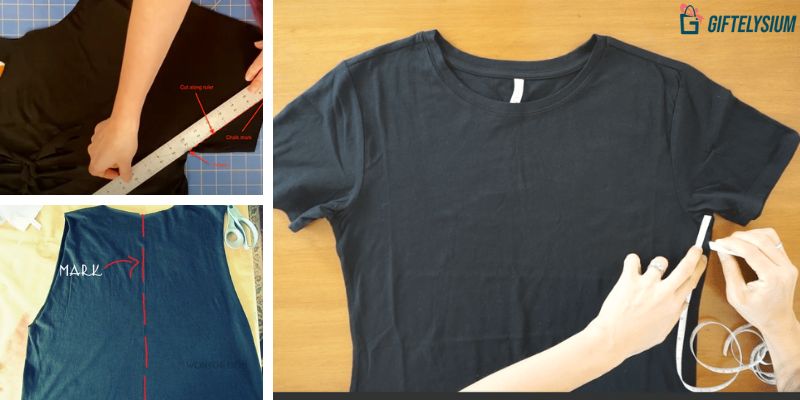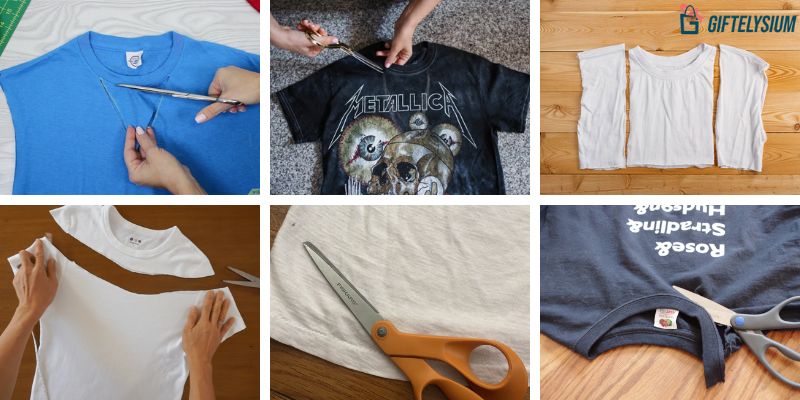Tank tops are a popular design for daily use of young people. In this essay, we delve into a comprehensive guide, offering step-by-step how to cut a tshirt into a tank top, fostering both sustainability and personal style.
How to cut a tshirt into a tank top?
Repurposing old t-shirts into trendy tank tops is a perfect choice for those facing a wardrobe brimming with t-shirts yet craving a fresh look. With tank tops reigning as a fashion staple, the transformation not only breathes new life into neglected garments but also aligns effortlessly with the current trend, offering a stylish and sustainable solution to wardrobe overflow.
How to cut a tshirt into a tank top: Step-by-step Guidelines
Step 1: Prepare materials and tools
Before diving into the transformation process, gather the essential materials needed in knowing how to cut a tshirt into a tank top. Start by selecting a suitable t-shirt from your wardrobe, preferably one made of cotton for ease of cutting.

Step 1: Prepare materials and tools
Alongside the t-shirt, ensure you have a fabric marker or chalk to mark cutting lines, sharp fabric scissors for precise cuts, a ruler or measuring tape to measure dimensions accurately, and a clean, flat surface to work on. Additionally, consider any extra materials you may want for embellishments or hemming, and make sure your workspace is well-lit for clear visibility throughout the process.
Step 2: Mark the measurements
Once you have gathered your materials, how to cut a tshirt into a tank top well is to mark the measurements on the t-shirt to guide your cutting process accurately. Lay the t-shirt flat on your workspace, ensuring it is smooth and wrinkle-free. Using a fabric marker or chalk, carefully mark the cutting lines according to the desired length and style of your tank top.

Step 2: Mark the measurements
For a sleeveless tank top, mark where you want the sleeves to end and the neckline to begin. If you're aiming for a specific style like a racerback or halter neck, outline the corresponding shapes accordingly. Take your time with this step to ensure precise markings, as they will serve as your guide for the next stage of the transformation process.
Step 3: Apply cutting technology
Now that you've marked the measurements on your t-shirt, it's time to execute the cutting process to transform it into a tank top. Grab your sharp fabric scissors and carefully begin cutting along the marked lines.
For a sleeveless tank top, start by cutting along the outlines to remove the sleeves, ensuring that your cuts are smooth and symmetrical on both sides of the shirt. Pay close attention to maintaining evenness to achieve a balanced look.
For a specific style such as a racerback or halter neck, continue cutting along the marked lines to create the desired shape. When cutting out the racerback or halter neck design, take care to maintain the integrity of the neckline and straps, ensuring they are even and proportional on both sides.
Similarly, for a racerback, extend the cuts towards the back of the t-shirt, leaving enough fabric to form the racerback straps. Similarly, for a halter neck, leave adequate fabric at the top to create the halter straps.

Throughout the cutting process, work slowly and methodically to achieve precise cuts and ensure that you're following the markings accurately. Remember, the cutting technique you apply will significantly impact the final appearance of your tank top, so take your time to get it just right. Once you've completed the cutting process, you're one step closer to transforming your t-shirt into a stylish tank top.
Step 4: Try on
After applying the cutting technique in the process how to cut a tshirt into a tank top, you should try on your newly transformed tank top. Begin by inspecting the edges of the cut areas to ensure they are even and free from any loose threads or frays. If necessary, trim any uneven edges with your scissors to achieve a polished look.
Next, if you've chosen to hem the edges of your tank top for a clean finish, use a sewing machine or hand-sewing to secure the raw edges. Alternatively, you can leave the edges raw for a more casual, distressed look.

Benefits of cutting a tshirt into a tank top
By knowing how to cut a tshirt into a tank top, it offers numerous benefits, including breathability and versatility in warm weather. Additionally, repurposing old t-shirts into tank tops promotes sustainability by giving new life to existing garments and reducing waste.
Environmental impact
First of all, understanding how to cut a tshirt into a tank top can have a significant environmental impact by promoting sustainable fashion practices. By repurposing old t-shirts rather than discarding them, individuals contribute to reducing textile waste and the strain on landfills.
This eco-friendly approach also minimizes the demand for new clothing production, which in turn reduces the consumption of natural resources and the carbon footprint associated with manufacturing processes. Overall, mastering the skill of transforming t-shirts into tank tops empowers individuals to make conscious choices that positively impact the environment.
Cost-effectiveness
Next, the way of cutting a t-shirt into a tank top brings about the benefit of cost-effectiveness, as it allows individuals to create new wardrobe pieces without the need to purchase additional clothing. By recycling old t-shirts, individuals can save money that would otherwise be spent on buying new tank tops.
This DIY approach not only helps stretch the budget but also offers a sense of satisfaction and empowerment through creativity and resourcefulness. Moreover, by reducing the frequency of purchasing new clothing items, individuals can contribute to more sustainable consumption habits and lessen fast fashion trending.
It can be said that learning how to cut a tshirt into a tank top not only revitalizes old clothing but also promotes sustainability and cost-effectiveness. By following the above steps, individuals can make a positive difference in both their closets and the environment, showcasing the power of creativity and resourcefulness in everyday life.
See more: Giftelysium Store

